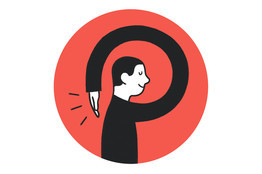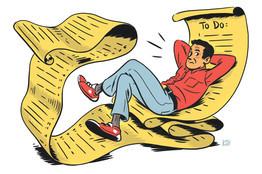Change your mood to stop procrastination
Surely, each of us prokrastriniru from time to time. The SmartProgress goal achievement service team is always on the lookout for a solution to this problem, and we recently found an interesting new approach. In the Wall Street Journal (by Sue Shellenbarger), in an article entitled “ To stop procrastinating, look to science of mood repair, ” tells how to beat procrastination with the help of a new method for changing mood. In this post I would like to cite the main points of the article:
Procrastinators, please note: if you have already tried to discipline yourself, but still continue to put it off until later, maybe it is time to try something else. There is a new approach: change your mood.

')
Often, procrastinators try to avoid anxiety or stress, which is a difficult task, through measures aimed at changing one's mood, for example, by checking social networks or sleeping. But this way, which researchers call “giving up a good mood,” makes procrastinators feel worse when they are faced with the consequences of a missed deadline or hasty work that they do at the last minute, says Timothy Picel, a junior professor of psychology and a researcher at Carlton University. in Ottawa, Canada.
Increasingly, psychologists and time management consultants are focusing on a new strategy: they help procrastinators to see that attempts to rectify the situation only hinder them and teach them to regulate their emotions in more productive ways.

If even the thought of work is nasty for you, try to imagine yourself in the future. Imagine how good it will be if you stop being lazy and finish the project (or how bad it will be if you don’t finish it).

If you are afraid of possible failure, then just start. Tell yourself that you do not have to do the whole project. Just make one or two items out of it.

If you blame yourself for procrastination, then stop doing it. Replace negative thoughts with something more positive.

If you are afraid of a specific item from your to-do list, start with something else, with a task that you prefer. The impulse you get will help you take on the most difficult task.
This approach is based on several studies conducted over the past two years, which show that negative emotions can thwart attempts at self-control.
Gisela Chodos was in the habit of postponing cleaning in her car until she filled up the salon with toys, wrappers, fast food packages, pencils and other things that she was ashamed to park in public or give someone a lift, says Gisela, the mother of two schoolchildren and part-time student at the computer university of Salt Lake City.
She stumbled upon Dr. Pichel's podcasts in 2012 and realized that she was just trying to feel better when she told herself that she would do something later. She says: “I try to escape from this feeling and avoid discomfort” - from the concern that her work will not be good enough or someone will not approve of it.
“Emotions underlie everything,” says Chodos. "And the understanding of this allows me to say:" Well, I feel discomfort, but I will feel even worse if I do not complete the task. " Due to this, she began to clean the cabin more often, and according to her: “My car hasn’t looked so bad for a long time that I was worried about the fact that someone could look inside.”
Dr. Pichel advises procrastinators to "just start and make the threshold to start working low enough." Procrastinators will most likely use these techniques when they understand how mood changes work, says Dr. Pichel, author of the book Solving the Procrastination Puzzle (2013). He adds: "A real improvement in mood comes when we decide to take on what is important to us."
He also advises procrastinators to train "time travel" - to present yourself in the future, to understand how good it will be when you complete the task, and vice versa. It helps procrastinators fight the current anxieties and worries that fill their heads so much that they are not able to think about the future, says Fuchia Sirua, a psychology professor at Bishop University in Sherbrooke, Québec, and the author of a study of 4,000 people who will be released soon.

Sean Gilbertson read Dr. Pichel's early book in 2012, having tried other time management methods before that, for example, keeping a daily diary of his emotions. A Minneapolis software engineer says that those methods were not deep enough for him to understand how emotions block his actions and change them to more positive ones. Using the time travel technique, he asks himself: “What is wrong with what happens if I grow? Will this affect the result of my work? How will this affect my reputation? Will this affect my increase and increase? "
He recently used this technique when programming a prototype medical device designed to help doctors prevent bedsores in patients in a wheelchair. He imagined the good emotions that he would receive by successfully completing the project and delighting his client and employer. He imagined that patients "would become happier and feel better." These positive emotions gave him the energy to test the device faster and complete the three-month project on time. The client was so glad that “it was a pleasure to even talk to him,” he says.
According to a study by Joseph Ferrari, a professor of psychology at De Paul University, Chicago, and other scientists, about 20% of adults are chronic procrastinators. Other studies suggest that the level among college students may be above 70%. Such a habit, according to a recent study of 22053 people in collaboration with Dr. Ferrari, threatens to turn into lower wages and a higher likelihood of unemployment.
Procrastination also promises such long-term problems as the inability to accumulate savings for retirement and the neglect of preventive medical care. Studies show that for men this problem is more serious than for women, according to scientists, this habit plays an important role in the male tendency to spend less time on education.
Most procrastinators torment themselves when they postpone something for later, repeating negative thoughts like “Why can't I do what I have to do?” Or “I have to be more responsible,” says Gordon Flett, a professor of psychology at York University in Toronto. "This negative internal dialogue reflects concerns and doubts about oneself," he says.
One of the strategies for correcting moods (self-forgiveness) is to dispel guilt and self-blame. According to a 2010 study led by Michael Wolm, a junior professor of psychology at Carlton, freshmen who have forgiven themselves for procrastination in preparation for the first exam prepared for the next exam better.
Thomas Flint learned about technology by reading self-regulation studies, including studies by Dr. Cyrus and Dr. Peechal. He began to use it after his family recently moved to a new home in Sewell, New Jersey. Instead of torturing himself for not immediately unpacking all the boxes in the garage, Flint decided to forgive himself and start with one step. “Well, I’ll work for just an hour, set the TV up and everything,” he said, and then watched a TV show as a reward. If you can allow yourself to carry out the task in stages, he says, then "this is a victory."

The SmartProgress service uses a method in which users are invited to break large targets into small stages.
This destroys the fear of the first actions and thereby relieves procrastination. The goals are by default open to the world and this facilitates communication between people with similar goals, searching for like-minded people. Use features such as templates , price words, and achieve the most ambitious goals!
Procrastinators, please note: if you have already tried to discipline yourself, but still continue to put it off until later, maybe it is time to try something else. There is a new approach: change your mood.

')
Often, procrastinators try to avoid anxiety or stress, which is a difficult task, through measures aimed at changing one's mood, for example, by checking social networks or sleeping. But this way, which researchers call “giving up a good mood,” makes procrastinators feel worse when they are faced with the consequences of a missed deadline or hasty work that they do at the last minute, says Timothy Picel, a junior professor of psychology and a researcher at Carlton University. in Ottawa, Canada.
Increasingly, psychologists and time management consultants are focusing on a new strategy: they help procrastinators to see that attempts to rectify the situation only hinder them and teach them to regulate their emotions in more productive ways.

Time travel.
If even the thought of work is nasty for you, try to imagine yourself in the future. Imagine how good it will be if you stop being lazy and finish the project (or how bad it will be if you don’t finish it).

Just start.
If you are afraid of possible failure, then just start. Tell yourself that you do not have to do the whole project. Just make one or two items out of it.

Forgive yourself.
If you blame yourself for procrastination, then stop doing it. Replace negative thoughts with something more positive.

Start with something simpler.
If you are afraid of a specific item from your to-do list, start with something else, with a task that you prefer. The impulse you get will help you take on the most difficult task.
This approach is based on several studies conducted over the past two years, which show that negative emotions can thwart attempts at self-control.
Gisela Chodos was in the habit of postponing cleaning in her car until she filled up the salon with toys, wrappers, fast food packages, pencils and other things that she was ashamed to park in public or give someone a lift, says Gisela, the mother of two schoolchildren and part-time student at the computer university of Salt Lake City.
She stumbled upon Dr. Pichel's podcasts in 2012 and realized that she was just trying to feel better when she told herself that she would do something later. She says: “I try to escape from this feeling and avoid discomfort” - from the concern that her work will not be good enough or someone will not approve of it.
“Emotions underlie everything,” says Chodos. "And the understanding of this allows me to say:" Well, I feel discomfort, but I will feel even worse if I do not complete the task. " Due to this, she began to clean the cabin more often, and according to her: “My car hasn’t looked so bad for a long time that I was worried about the fact that someone could look inside.”
Dr. Pichel advises procrastinators to "just start and make the threshold to start working low enough." Procrastinators will most likely use these techniques when they understand how mood changes work, says Dr. Pichel, author of the book Solving the Procrastination Puzzle (2013). He adds: "A real improvement in mood comes when we decide to take on what is important to us."
He also advises procrastinators to train "time travel" - to present yourself in the future, to understand how good it will be when you complete the task, and vice versa. It helps procrastinators fight the current anxieties and worries that fill their heads so much that they are not able to think about the future, says Fuchia Sirua, a psychology professor at Bishop University in Sherbrooke, Québec, and the author of a study of 4,000 people who will be released soon.

Sean Gilbertson read Dr. Pichel's early book in 2012, having tried other time management methods before that, for example, keeping a daily diary of his emotions. A Minneapolis software engineer says that those methods were not deep enough for him to understand how emotions block his actions and change them to more positive ones. Using the time travel technique, he asks himself: “What is wrong with what happens if I grow? Will this affect the result of my work? How will this affect my reputation? Will this affect my increase and increase? "
He recently used this technique when programming a prototype medical device designed to help doctors prevent bedsores in patients in a wheelchair. He imagined the good emotions that he would receive by successfully completing the project and delighting his client and employer. He imagined that patients "would become happier and feel better." These positive emotions gave him the energy to test the device faster and complete the three-month project on time. The client was so glad that “it was a pleasure to even talk to him,” he says.
According to a study by Joseph Ferrari, a professor of psychology at De Paul University, Chicago, and other scientists, about 20% of adults are chronic procrastinators. Other studies suggest that the level among college students may be above 70%. Such a habit, according to a recent study of 22053 people in collaboration with Dr. Ferrari, threatens to turn into lower wages and a higher likelihood of unemployment.
Procrastination also promises such long-term problems as the inability to accumulate savings for retirement and the neglect of preventive medical care. Studies show that for men this problem is more serious than for women, according to scientists, this habit plays an important role in the male tendency to spend less time on education.
Most procrastinators torment themselves when they postpone something for later, repeating negative thoughts like “Why can't I do what I have to do?” Or “I have to be more responsible,” says Gordon Flett, a professor of psychology at York University in Toronto. "This negative internal dialogue reflects concerns and doubts about oneself," he says.
One of the strategies for correcting moods (self-forgiveness) is to dispel guilt and self-blame. According to a 2010 study led by Michael Wolm, a junior professor of psychology at Carlton, freshmen who have forgiven themselves for procrastination in preparation for the first exam prepared for the next exam better.
Thomas Flint learned about technology by reading self-regulation studies, including studies by Dr. Cyrus and Dr. Peechal. He began to use it after his family recently moved to a new home in Sewell, New Jersey. Instead of torturing himself for not immediately unpacking all the boxes in the garage, Flint decided to forgive himself and start with one step. “Well, I’ll work for just an hour, set the TV up and everything,” he said, and then watched a TV show as a reward. If you can allow yourself to carry out the task in stages, he says, then "this is a victory."

The SmartProgress service uses a method in which users are invited to break large targets into small stages.
This destroys the fear of the first actions and thereby relieves procrastination. The goals are by default open to the world and this facilitates communication between people with similar goals, searching for like-minded people. Use features such as templates , price words, and achieve the most ambitious goals!
Source: https://habr.com/ru/post/212033/
All Articles